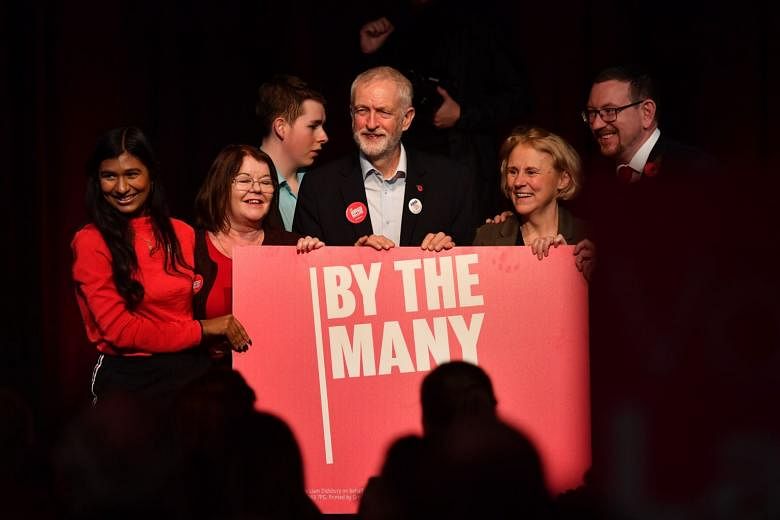LONDON • They are divided, unpopular and have been accused by their former colleagues of racism. But opposition leader Jeremy Corbyn and his allies in Britain's Labour Party could yet take power in next month's general election.
As bad as Mr Corbyn looks on paper, he has a potential path to power. The Conservatives have been in office so long that austerity-bitten voters want change. Opinion polls have misjudged the public mood before. Prime Minister Boris Johnson is a gaffe-prone leader who is a divisive figure in the Brexit landscape.
If Mr Corbyn shores up his support in Labour heartlands in northern and central England, and with Mr Johnson viewed increasingly with suspicion in Scotland, an unpredictable election could see the Prime Minister ousted.
The Labour leader himself is a deeply divisive figure in his own tribe. Just this week, his deputy quit and a former Labour Member of Parliament publicly urged the country to vote Conservative. The Jewish Chronicle newspaper then ran a front-page article describing Mr Corbyn as an anti-Semite.
It is a grim narrative for an opposition hoping to persuade the country to vote it into power on Dec 12.
The Conservatives have been in office for nine years, but tearing themselves apart over Brexit for the past three. Mr Johnson is now seeking to do something rare for a government in British elections and increase the number of seats his ruling party has in Parliament.
Mr Corbyn, meanwhile, has been calling for an election ever since the last one in June 2017 put him within striking distance of replacing the Tories as the government. Yet with the campaign now under way, the opinion polls tell a very different story. After rating close to the Conservatives for much of the last two years, Labour goes into the race behind. According to YouGov, Labour has not polled above 27 per cent in six months. The Conservatives are on 36 per cent.
Mr Corbyn, in particular, polls badly. Just 23 per cent of people say they have a positive view of him - against 59 per cent who say they have a negative view. More than half of people who voted Labour in the 2017 election think Mr Corbyn should be replaced as leader.
After decades in which Labour has aimed for the centre ground of politics, talking about wealth creation and public spending, Mr Corbyn has moved it firmly to the left. On foreign policy, Mr Corbyn's position is far outside the consensus of post-war British politics. He is a critic of Nato, viewing it as a "danger to world peace". Yet none of this means he cannot become prime minister next month. The 2017 election saw him shrug off criticism of his views, and pick up votes where they mattered.
His strategy then included a series of voter-pleasing offers such as extra bank holidays. Those tactics seem to be in play again.
For his part, Mr Johnson's holds a Brexit position that has forced him into a strategy where he risks losing seats in pro-EU cities, the south of England, and Scotland. If he is to retain power and win a majority, Mr Johnson must prevail in northern and central England. But many of these are Labour strongholds that the Tories have never won.
When they tried this strategy in 2017, they came within a few thousand votes of losing power entirely. Lifelong Labour voters in these industrial districts may still baulk at ditching their tribal allegiances in order to vote for the Tories, a party many have spent their lives hating.
However, if the Tories are the largest party after the election but fall short of an overall majority, they will probably find it difficult to form a coalition or even a looser alliance to prop up Mr Johnson.
In another so-called hung Parliament, Mr Corbyn would have more potential allies among the smaller parties. The Scottish National Party has said it would never work to keep Mr Johnson in office but could help Mr Corbyn in exchange for a referendum on independence for Scotland.
The smaller Liberal Democrats have ruled out supporting a Corbyn government, but party leader Jo Swinson might face a choice: Mr Corbyn or Mr Johnson. And as an opponent of Brexit, she has said she could not back the Tory leader.
BLOOMBERG











